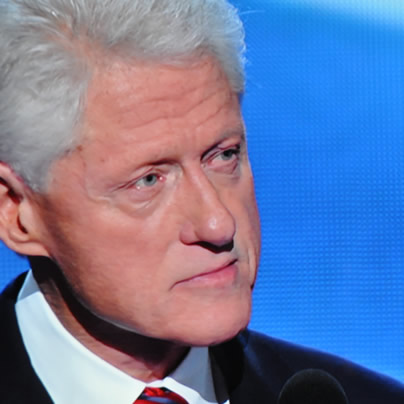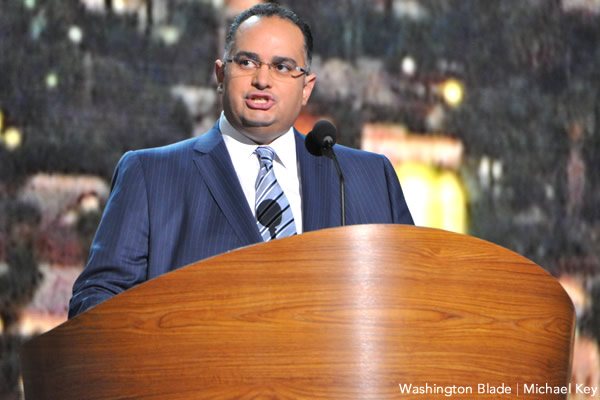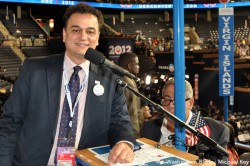National
DNC 2012: Clinton delivers rousing speech at convention
Defends Obama on economy, attacks Romney


Former President Bill Clinton addressing the Democratic National Convention (Blade photo by Michael Key)
CHARLOTTE, N.C. — A rousing speech from former President Bill Clinton that capped off Wednesday night at the Democratic National Convention was well-received by attendees, although the day wasn’t free of controversy.
Clinton took to the podium at the Time Warner Cable Arena to call formally for the nomination of Barack Obama as the Democratic nominee for president, but not before taking digs at Republican nominee Mitt Romney and others for what he said were false assertions about the current administration.
Among the accusations made by GOP vice residential nominee Paul Ryan that Clinton disputed was the claim that Obama robbed Medicare of $716 billion in an effort that could imperil the benefits of seniors.
“Here’s what really happened,” Clinton said. “There were no cuts to benefits. None. What the president did was save money by cutting unwarranted subsidies to providers and insurance companies that weren’t making people any healthier. He used the saving to close the donut hole in the Medicare drug program, and to add eight years to the life of the Medicare Trust Fund. It’s now solvent until 2024. So President Obama and the Democrats didn’t weaken Medicare, they strengthened it.”
The former president, who signed welfare reform into law in 1996, also took issue with Republican claims that Obama had waived the work requirement for welfare reform — an assertion echoed last week by former U.S. Sen. Rick Santorum on stage at the Republican National Convention.
“When some Republican governors asked to try new ways to put people on welfare back to work, the Obama administration said they would only do it if they had a credible plan to increase employment by 20 percent,” Clinton said. “You hear that? More work. So the claim that President Obama weakened welfare reform’s work requirement is just not true, but they keep running ads on it.”
Clinton also came to Obama’s defense on the economy, saying the economic situation that had befallen the nation in 2008 under the Bush administration was so dire that Obama couldn’t be expected to reverse course in just one term in office, but more progress should be seen in a second term.
“President Obama started with a much weaker economy than I did,” Clinton said. “No president — not me or any of my predecessors could have repaired all the damage in just four years. But conditions are improving and if you’ll renew the president’s contract you will feel it.”
The former president also touted Obama’s signature legislative achievement — the Affordable Care Act — saying claims that it amounts to a government takeover of health care are untrue.
“Soon the insurance companies, not the government, will have millions of new customers — many of them middle class people with pre-existing conditions,” Clinton said. “And for the last two years, health care spending has grown under 4 percent, for the first time in 50 years. So are we all better off because President Obama fought for it and passed it? You bet we are.”
Clinton, who signed into law “Don’t Ask, Don’t Tell” and the Defense of Marriage Act, made no reference to LGBT issues during his remarks. The former president has come out for marriage equality and has since called for DOMA repeal and an end to the military’s gay ban before it was ultimately lifted.
But Clinton did express gratitude to former President George W. Bush for creating the President’s Emergency Plan for AIDS Relief when talking about the accomplishments of former Republican presidents and how he could never hate the GOP the way the far right hates Obama.
“I am grateful to President George W. Bush for PEPFAR, which is saving the lives of millions of people in poor countries and to both Presidents Bush for the work we’ve done together after the South Asia tsunami, Hurricane Katrina and the Haitian earthquake,” Clinton said.
Attendees at the Democratic National Convention were captivated by Clinton as he delivered his remarks. His speech was punctuated by applause and shouts of “Four more years! Four more years!” After the remarks, Obama entered onstage alongside Clinton, who gave a bow to the current president before the two embraced.
Adam Ebbin, a gay delegate from Virginia and member of the Virginia State Senate, told the Washington Blade after Clinton’s speech that the former president “made the case for why we need to re-elect the president” and to keep health care reform on the books.
“When he talked about health care and what it meant, and economic polices and tax fairness, I think it really resonated with the crowd here in the hall and hopefully with the crowd at home,” Ebbin said.
U.S. Senate candidate Elizabeth Warren, who’s locked in a tight race to unseat Sen. Scott Brown (R-Mass.), also delivered remarks that stirred the audience as she emphasized the struggle of the middle class to achieve the American dream and took a dig at Romney’s infamous remark that “corporations are people.”
“No, Gov. Romney, corporations are not people,” Warren said. “People have hearts, they have kids, they get jobs, they get sick, they cry, they dance. They live, they love, and they die. And that matters. That matters because we don’t run this country for corporations, we run it for people. And that’s why we need Barack Obama.”
But in comparison to Tuesday, when at least four openly gay speakers took to the podium and a multitude of others who spoke incorporated references to LGBT rights in their remarks — explicit references to the LGBT community were fewer on Wednesday.
The most notable exception were remarks from gay California Assembly Speaker John A. Perez, who talked about the advancement of LGBT rights in addition to addressing women’s and immigrant-related issues. However, he wasn’t given a primetime slot.
Perez addressed the continued lack of federal non-discrimination workplace protections.
“In too many states, even some folks who have a job wake up every morning in fear that they will lose that job simply for being gay, lesbian, bisexual or transgender,” Perez said. “We fight for them.”
Perez also praised Obama for repealing “Don’t Ask, Don’t Tell” and for coming out in support of marriage equality, saying they’re evidence of Obama working to protect and advance “opportunities” for all American people.
“He repealed ‘Don’t Ask, Don’t Tell,’ giving LGBT Americans the opportunity to proudly and openly serve our nation in uniform,” Perez said. “And he’s standing up for the right of LGBT Americans to say, ‘I do.'”
More gay speakers should follow at the convention. Gay Rep. Barney Frank (D-Mass.), who’s retiring from Congress at the end of this year, was initially slated to speak on Wednesday, but he agreed to move his speech to the next day due to, according a Democratic official, the “overwhelming enthusiasm in the arena and extended applauses.” Lesbian U.S. Senate candidate Tammy Baldwin is scheduled to speak on the same day.
Other speakers also made note of LGBT issues or touted the Obama administration’s progress on them. References to “Don’t Ask, Don’t Tell” repeal were made by Congressional Black Caucus Chair Emanuel Cleaver II (D-Mo.), Rep. Luis Guiterrez (D-Ill.) — who also mentioned marriage equality — and House Minority Leader Nancy Pelosi (D-Calif.). California Attorney General Kamala Harris, who refused to defend Proposition 8 in court, also incorporated marriage equality in her speech, saying the American dream belongs to “the men and women across this country who know it shouldn’t be against the law to marry the person you love.”
The day also saw controversy as a result of the party platform. Shortly after the gavel time starting the session for the day, party leaders attempted to amend the platform after controversy ensued to include a mention of God in the manifesto as well as an assertion that Jerusalem is the capital of Israel. The amendments reportedly were backed by Obama.
Democratic National Committee chair and Los Angeles Mayor Antonio Villaraigosa had to ask for three voice votes to get the the two-thirds vote necessary for the changes.
But Democrats were unified at the end of the evening when the roll call of the states was read to formally award delegates to Obama to make him the Democratic nominee for president. All of the 5,963 delegates were awarded to Obama. Notably, at least three of the speakers representing their states during the roll call were gay: Colorado State Democratic Chair Rick Palacio; New Hampshire State Democratic Chair Ray Buckley; and Rhode Island House Assembly Speaker Gordon Fox.
After the roll call, Buckley told the Blade being able to represent New Hampshire in the nominating process for Rhode Island was deeply personal for him because he recalled that each state had sent this year at least one LGBT delegate to the convention.
“The only time I really choked up was when we did the roll call, and the fact every single state and territory had at least somebody [LGBT] there,” Buckley said. “Some little gay kid — when they’re 12, 13 realizes they’re gay — is going to realize that this is the party that will stand for them and stand with them, and welcome them and empower them and embrace them. Not a lot of people gave a lot of positive reinforcement to people my age when we were adolescents and I think it sends a very powerful message.”
U.S. Military/Pentagon
4th Circuit rules against discharged service members with HIV
Judges overturned lower court ruling

A federal appeals court on Wednesday reversed a lower court ruling that struck down the Pentagon’s ban on people with HIV enlisting in the military.
The conservative three-judge panel on the 4th U.S. Circuit Court of Appeals overturned a 2024 ruling that had declared the Defense Department and Army policies barring all people living with HIV from military service unconstitutional.
The 4th Circuit, which covers Maryland, North Carolina, South Carolina, Virginia, and West Virginia, held that the military has a “rational basis” for maintaining medical standards that categorically exclude people living with HIV from enlisting, even those with undetectable viral loads — meaning their viral levels are so low that they cannot transmit the virus and can perform all duties without health limitations.
This decision could have implications for other federal circuits dealing with HIV discrimination cases, as well as for nationwide military policy.
The case, Wilkins v. Hegseth, was filed in November 2022 by Lambda Legal and other HIV advocacy groups on behalf of three individual plaintiffs who could not enlist or re-enlist based on their HIV status, as well as the organizational plaintiff Minority Veterans of America.
The plaintiffs include a transgender woman who was honorably discharged from the Army for being HIV-positive, a gay man who was in the Georgia National Guard but cannot join the Army, and a cisgender woman who cannot enlist in the Army because she has HIV, along with the advocacy organization Minority Veterans of America.
Isaiah Wilkins, the gay man, was separated from the Army Reserves and disenrolled from the U.S. Military Academy Preparatory School after testing positive for HIV. His legal counsel argued that the military’s policy violates his equal protection rights under the Fifth Amendment’s Due Process Clause.
In August 2024, a U.S. District Court sided with Wilkins, forcing the military to remove the policy barring all people living with HIV from joining the U.S. Armed Services. The court cited that this policy — and ones like it that discriminate based on HIV status — are “irrational, arbitrary, and capricious” and “contribute to the ongoing stigma surrounding HIV-positive individuals while actively hampering the military’s own recruitment goals.”
The Pentagon appealed the decision, seeking to reinstate the ban, and succeeded with Wednesday’s court ruling.
Judge Paul V. Niemeyer, one of the three-judge panel nominated to the 4th Circuit by President George H. W. Bush, wrote in his judicial opinion that the military is “a specialized society separate from civilian society,” and that the military’s “professional judgments in this case [are] reasonably related to its military mission,” and thus “we conclude that the plaintiffs’ claims fail as a matter of law.”
“We are deeply disappointed that the 4th Circuit has chosen to uphold discrimination over medical reality,” said Gregory Nevins, senior counsel and employment fairness project director for Lambda Legal. “Modern science has unequivocally shown that HIV is a chronic, treatable condition. People with undetectable viral loads can deploy anywhere, perform all duties without limitation, and pose no transmission risk to others. This ruling ignores decades of medical advancement and the proven ability of people living with HIV to serve with distinction.”
“As both the 4th Circuit and the district court previously held, deference to the military does not extend to irrational decision-making,” said Scott Schoettes, who argued the case on appeal. “Today, servicemembers living with HIV are performing all kinds of roles in the military and are fully deployable into combat. Denying others the opportunity to join their ranks is just as irrational as the military’s former policy.”
New York
Lawsuit to restore Stonewall Pride flag filed
Lambda Legal, Washington Litigation Group brought case in federal court

Lambda Legal and Washington Litigation Group filed a lawsuit on Tuesday, challenging the Trump-Vance administration’s removal of the Pride flag from the Stonewall National Monument in New York earlier this month.
The suit, filed in the U.S. District Court for the Southern District of New York, asks the court to rule the removal of the Pride flag at the Stonewall National Monument is unconstitutional under the Administrative Procedures Act — and demands it be restored.
The National Park Service issued a memorandum on Jan. 21 restricting the flags that are allowed to fly at National Parks. The directive was signed by Trump-appointed National Park Service Acting Director Jessica Bowron.
“Current Department of the Interior policy provides that the National Park Service may only fly the U.S. flag, Department of the Interior flags, and the Prisoner of War/Missing in Action flag on flagpoles and public display points,” the letter from the National Park Service reads. “The policy allows limited exceptions, permitting non-agency flags when they serve an official purpose.”
That “official purpose” is the grounds on which Lambda Legal and the Washington Litigation Group are hoping a judge will agree with them — that the Pride flag at the Stonewall National Monument, the birthplace of LGBTQ rights movement in the U.S., is justified to fly there.
The plaintiffs include the Gilbert Baker Foundation, Charles Beal, Village Preservation, and Equality New York.
The defendants include Interior Secretary Doug Burgum; Bowron; and Amy Sebring, the Superintendent of Manhattan Sites for the National Park Service.
“The government’s decision is deeply disturbing and is just the latest example of the Trump administration targeting the LGBTQ+ community. The Park Service’s policies permit flying flags that provide historical context at monuments,” said Alexander Kristofcak, a lawyer with the Washington Litigation Group, which is lead counsel for plaintiffs. “That is precisely what the Pride flag does. It provides important context for a monument that honors a watershed moment in LGBTQ+ history. At best, the government misread its regulations. At worst, the government singled out the LGBTQ+ community. Either way, its actions are unlawful.”
“Stonewall is the birthplace of the modern LGBTQ+ rights movement,” said Beal, the president of the Gilbert Baker Foundation. The foundation’s mission is to protect and extend the legacy of Gilbert Baker, the creator of the Pride flag.
“The Pride flag is recognized globally as a symbol of hope and liberation for the LGBTQ+ community, whose efforts and resistance define this monument. Removing it would, in fact, erase its history and the voices Stonewall honors,” Beal added.
The APA was first enacted in 1946 following President Franklin D. Roosevelt’s creation of multiple new government agencies under the New Deal. As these agencies began to find their footing, Congress grew increasingly worried that the expanding powers these autonomous federal agencies possessed might grow too large without regulation.
The 79th Congress passed legislation to minimize the scope of these new agencies — and to give them guardrails for their work. In the APA, there are four outlined goals: 1) to require agencies to keep the public informed of their organization, procedures, and rules; 2) to provide for public participation in the rule-making process, for instance through public commenting; 3) to establish uniform standards for the conduct of formal rule-making and adjudication; and 4) to define the scope of judicial review.
In layman’s terms, the APA was designed “to avoid dictatorship and central planning,” as George Shepherd wrote in the Northwestern Law Review in 1996, explaining its function.
Lambda Legal and the Washington Litigation Group are arguing that not only is the flag justified to fly at the Stonewall National Monument, making the directive obsolete, but also that the National Park Service violated the APA by bypassing the second element outlined in the law.
“The Pride flag at the Stonewall National Monument honors the history of the fight for LGBTQ+ liberation. It is an integral part of the story this site was created to tell,” said Lambda Legal Chief Legal Advocacy Officer Douglas F. Curtis in a statement. “Its removal continues the Trump administration’s disregard for what the law actually requires in their endless campaign to target our community for erasure and we will not let it stand.”
The Washington Blade reached out to the NPS for comment, and received no response.
Massachusetts
EXCLUSIVE: Markey says transgender rights fight is ‘next frontier’
Mass. senator, 79, running for re-election

For more than half a century, U.S. Sen. Edward Markey (D-Mass.) has built a career around the idea that government can — and should — expand rights rather than restrict them. From pushing for environmental protections to consumer safeguards and civil liberties, the Massachusetts Democrat has long aligned himself with progressive causes.
In this political moment, as transgender Americans face a wave of federal and state-level attacks, Markey says this fight in particular demands urgent attention.
The Washington Blade spoke with Markey on Tuesday to discuss his reintroduction of the Trans Bill of Rights, his long record on LGBTQ rights, and his reelection campaign — a campaign he frames not simply as a bid for another term, but as part of a broader struggle over the direction of American democracy.
Markey’s political career spans more than five decades.
From 1973 to 1976, he served in the Massachusetts House of Representatives, representing the 16th Middlesex District, which includes the Boston suburbs of Malden and Melrose, as well as the 26th Middlesex District.
In 1976, he successfully ran for Congress, winning the Democratic primary and defeating Republican Richard Daly in the general election by a 77-18 percent margin. He went on to serve in the U.S. House of Representatives for nearly four decades, from 1976 until 2013.
Markey in 2013 ran in the special election to fill an open Senate seat after John Kerry became secretary of state in the Obama-Biden administration. Markey defeated Republican Gabriel E. Gomez and completed the remaining 17 months of Kerry’s term. Markey took office on July 16, 2013, and has represented Massachusetts in the U.S. Senate ever since.
Over the years, Markey has built a reputation as a progressive Democrat focused on human rights. From environmental protection and consumer advocacy to civil liberties, he has consistently pushed for an expansive view of constitutional protections. In the Senate, he co-authored the Green New Deal, has advocated for Medicare for All, and has broadly championed civil rights. His committee work has included leadership roles on Senate Foreign Relations Committee and the Senate Health, Education, Labor and Pensions (HELP) Committee.
Now, amid what he describes as escalating federal attacks on trans Americans, Markey said the reintroduction of the Trans Bill of Rights is not only urgent, but necessary for thousands of Americans simply trying to live their lives.
“The first day Donald Trump was in office, he began a relentless assault on the rights of transgender and nonbinary people,” Markey told the Blade. “It started with Executive Order 14168 ‘Defending women from gender ideology extremism and restoring biological truth to the federal government.’ That executive order mandates that federal agencies define gender as an unchangeable male/female binary determined by sex assigned at birth or conception.”
He argued that the executive action coincided with a sweeping legislative push in Republican-controlled statehouses.
“Last year, we saw over 1,000 anti trans bills across 49 states and the federal government were introduced. In January of 2026, to today, we’ve already seen 689 bills introduced,” he said. “The trans community needs to know there are allies who are willing to stand up for them and affirmatively declare that trans people deserve all of the rights to fully participate in public life like everyone else — so Trump and MAGA Republicans have tried hard over the last year to legislate all of these, all of these restrictions.”
Markey said the updated version of the Trans Bill of Rights is designed as a direct response to what he views as an increasingly aggressive posture from the Trump-Vance administration and its GOP congressional allies. He emphasized that the legislation reflects new threats that have emerged since the bill’s original introduction.
In order to respond to those developments, Markey worked with U.S. Rep. Pramila Jayapal (D-Wash.) to draft a revised version that would more comprehensively codify protections for trans Americans under federal law.
“What we’ve added to the legislation is this is all new,” he explained, describing how these proposed protections would fit into all facets of trans Americans’ lives. “This year’s version of it that Congresswoman Jayapal and I drafted, there’s an anti-trans bias in the immigration system should be eliminated.”
“Providers of gender affirming care should be protected from specious consumer and medical fraud accusations. The sexual and gender minority research office at the National Institutes of Health should be reopened and remain operational,” he continued. “Military discharges or transgender and nonbinary veterans and reclassification of discharge status should be reviewed. Housing assignments for transgender and nonbinary people in government custody should be based on their safety needs and involuntary, solitary or affirmative administrative confinement of a transgender or nonbinary individual because of their gender identity should be prohibited, so without it, all of those additional protections, and that’s Just to respond to the to the ever increasingly aggressive posture which Donald Trump and his mega Republicans are taking towards the transgender.”
The scope of the bill, he argued, reflects the breadth of challenges trans Americans face — from immigration and health care access to military service and incarceration conditions. In his view, the legislation is both a substantive policy response and a moral declaration.
On whether the bill can pass in the current Congress, Markey acknowledged the political hardships but insisted the effort itself carries as much significance as the bill’s success.
“Well, Republicans have become the party of capitulation, not courage,” Markey said. “We need Republicans of courage to stand up to Donald Trump and his hateful attacks. But amid the relentless attacks on the rights and lives of transgender people across the country by Trump and MAGA Republicans, it is critical to show the community that they have allies in Congress — the Trans Bill of Rights is an affirmative declaration that federal lawmakers believe trans rights are human eights and the trans people have the right to fully participate in public life, just like everyone else.”
Even if the legislation does not advance in this congress, Markey said, it establishes a framework for future action.
“It is very important that Congresswoman Jayapal and I introduce this legislation as a benchmark for what it is that we are going to be fighting for, not just this year, but next year,” he said when asked if the bill stood a legitimate chance of passing the federal legislative office when margins are so tight. “After we win the House and Senate to create a brand new, you know, floor for what we have to pass as legislation … We can give permanent protections.”
He framed the bill as groundwork for a future Congress in which Democrats regain control of both chambers, creating what he described as a necessary roadblock to what he views as the Trump-Vance administration’s increasingly restrictive agenda.
Markey also placed the current political climate within the longer arc of LGBTQ history and activism.
When asked how LGBTQ Americans should respond to the removal of the Pride flag from the Stonewall National Monument — the first national monument dedicated to recognizing the LGBTQ rights movement — Markey was unwavering.
“My message from Stonewall to today is that there has been an ongoing battle to change the way in which our country responds to the needs of the LGBTQ and more specifically the transgender community,” he said. “When they seek to take down symbols of progress, we have to raise our voices.”
“We can’t agonize,” Markey stressed. “We have to organize in order to ensure that that community understands, and believes that we have their back and that we’re not going away — and that ultimately we will prevail.”
Markey added, “That this hatefully picketed White House is going to continue to demonize the transgender community for political gain, and they just have to know that there’s going to be an active, energetic resistance, that that is going to be there in the Senate and across our country.”
Pam Bondi ‘is clearly part’ of Epstein cover up
Beyond LGBTQ issues, Markey also addressed controversy surrounding Attorney General Pam Bondi and the handling of the Epstein files, sharply criticizing the administration’s response to congressional inquiries.
“Well, Pam Bondi is clearly part of a cover up,” Markey said when asked about the attorney general’s testimony to Congress amid growing bipartisan outrage over the way the White House has handled the release of the Epstein files. “She is clearly part of a whitewash which is taking place in the Trump administration … According to the New York Times, Trump has been mentioned 38,000 times in the [Epstein] files which have been released thus far. There are still 3 million more pages that have yet to be released. So this is clearly a cover up. Bondi was nothing more than disgraceful in the way in which she was responding to our questions.”
“I think in many ways, she worsened the position of the Trump administration by the willful ignoring of the central questions which were being asked by the committee,” he added.
‘I am as energized as I have ever been’
As he campaigns for reelection, Markey said the stakes extend beyond any single issue or piece of legislation. He framed his candidacy as part of a broader fight for democracy and constitutional protections — and one that makes him, as a 79-year-old, feel more capable and spirited than ever.
“Well, I am as energized as I have ever been,” he said. “Donald Trump is bringing out the Malden in me. My father was a truck driver in Malden, Mass., and I have had the opportunity of becoming a United States senator, and in this fight, I am looking ahead and leading the way, affirming rights for the trans community, showing up to defend their rights when they are threatened from this administration.”
He continued, reiterating his commitment not only to the trans community but to a future in which progressive and proactive pushes for expanded rights are seen, heard, and actualized.
“Our democracy is under threat from Donald Trump and MAGA Republicans who are trying to roll back everything we fought for and threaten everything we stand for in Massachusetts, and their corruption, their greed, their hate, just make me want to fight harder.”
When asked why Massachusetts voters should reelect him, he said his age and experience as a 79-year-old are assets rather than hindrances.
“That’s exactly what I’m doing and what I’m focused upon, traveling across the state, showing up for the families of Massachusetts, and I’m focused on the fights of today and the future to ensure that people have access to affordable health care, to clean air, clean water, the ability to pay for everyday necessities like energy and groceries.”
“I just don’t talk about progress. I deliver it,” he added. “There’s more to deliver for the people of Massachusetts and across this country, and I’m not stopping now as energized as I’ve ever been, and a focus on the future, and that future includes ensuring that the transgender community receives all of the protections of the United States Constitution that every American is entitled to, and that is the next frontier, and we have to continue to fight to make that promise a reality for that beleaguered community that Trump is deliberately targeting.”
-

 District of Columbia5 days ago
District of Columbia5 days agoDeon Jones speaks about D.C. Department of Corrections bias lawsuit settlement
-

 European Union5 days ago
European Union5 days agoEuropean Parliament resolution backs ‘full recognition of trans women as women’
-

 Africa4 days ago
Africa4 days agoLGBTQ groups question US health agreements with African countries
-

 National4 days ago
National4 days agoTrump falsely links trans people to terrorism























